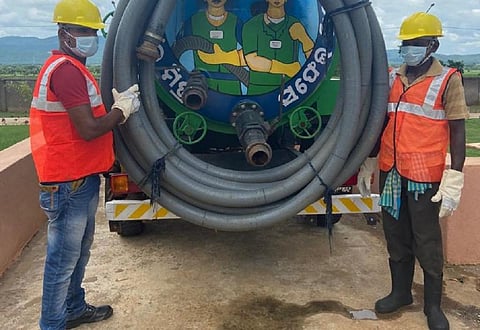

The Narendra Modi government initiated the Swachh Bharat Mission across India in 2014 to eliminate open defecation and improve solid waste management. The mission is touted as a game changer by the government in terms of giving citizens access to toilets. But the clean-up of toilets by workers often comes at significant cost to them.
Rakesh and Mukesh are two such workers who operate in Odagaon, a small town in Odisha. Here is how they spend a typical day.
A day in the life
It is early morning. Rakesh has just received a call from a house. He commutes on his bicycle for four kilometres and reaches his office.
He puts on his dirtiest clothes. Mukesh also reaches the office on his bright red-coloured motorcycle. Mukesh is the driver of the cesspool truck and Rakesh is the helper.
Rakesh and Mukesh fill their form and get onto the cesspool truck. They navigate narrow streets and alleyways and finally reach the house, where the owner is eagerly awaiting for them.
Rakesh and Mukesh now put on a jacket, gloves and gumboots. This is the minimum they can do for their safety.
Forty-five-year-old Rakesh then pulls in the 111 feet pipe weighing 80-85 kilogram weight from the cesspool truck. He winces in pain as he does so.
The pain in his back and shoulders from yesterday’s desludging has not gone yet. Rakesh hasn’t taken enough rest.
Both, Mukesh and Rakesh, pull and carry the pipe till it reaches the gate of the house. The owner of the house helps them locate the septic tank which at the back of the building.
Unfortunately, they are not allowed to enter this Brahmin household from the front gate, as they could make it ‘impure’, considering their caste and work. Allowing Dalits inside one’s house is a challenge even when they have come to collect your poop.
So, the owner offers them access from the back. The septic tank has not been cleaned for the last 10 years and now, the house has become stinky and soiled due to spillage.
These kinds of conditions are considered normal for these workers. Rakesh belongs to a Dalit family and has been doing this job for a couple of years, earlier in a nearby metro city and now in this small town after losing his wife.
Mukesh’s traditional occupation is to clean ‘Shivalingams’ in temples: “I came here as a regular driver but I got this work. Since I have been allotted this, so handling the pipe and working together is necessary. We are working for an honest living. So, there is no problem in doing this work.”
They have to access the septic tank by going around the building. The pipe doesn’t go that far.
Rakesh and Mukesh will now have get into the household carrying the desludging pipe from the front and cleaning the septic tank.
Since he has to get his septic tank cleaned, the owner agrees to let them in. But Rakesh and Mukesh still have to take off their gumboots at the threshold.
Rakesh uses a bamboo stick to gauge the thickness of the sludge. It (sludge) has been deposited at the bottom of the tank and has decomposed, with little water.
Rakesh pours water, whirls it with help of his hands to make it easier for the pump to extract the sludge. He identifies sanitary napkins, condoms, plastic wrappers in the sludge. He removes these materials without taking enough precautions.
“What to do? We have reached the house to work. If we won’t remove these materials, they won’t pay the money,” Rakesh says.
He adds that desludging a septic tank is easier than desludging a pit latrine. The containment has no moisture, as moisture has soaked into the soil. All that the pit has is sludge, which looks no different than soil.
After desludging is completed, both of them have to carry the same pipe to the cesspool on the truck. Rakesh often forgets about washing his hands after desludging, making himself vulnerable to disease.
If the tank is not emptied once, the desludging process has to be done twice or thrice. For this, they have to collect the sludge from the household and dispose it at the faecal sludge treatment plant a number of times.
Once the process is completed, they take a bath at the plant. During this process, they may have to skip their meals. When there are no trips, they clean their cesspool truck, considering the truck helps them earn their daily livelihood. Being contractual employees of the government, Rakesh earns Rs 300 per day and Mukesh Rs 401 per day.
According to the National Statistical Office Survey, only 71.3 per cent of rural households and about 96.2 per cent of urban households have access to toilets.
Of them, about 50.9 per cent of rural households and 48.9 per cent of urban households use the ‘flush/pour-flush to septic tank’ system. These septic tanks have to be cleaned / desludged by none other than sanitation workers.